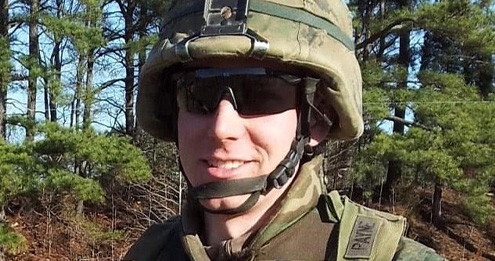- Active Duty
- Project Management
- Marines
Certification Spotlight
Credentialing success from the Service community
How a Marine Corps Captain “stacks” certifications to continue learning and expanding his abilities
Nicholas Payne, Marine Corps Captain
Many people view certifications as a means to an end; getting specific certifications to better themselves for career advancement or a transition. For Nicholas Payne, certification allows him to continue learning and applying new approaches to workplace challenges, which motivated him to complete eight certifications while serving on active duty in the Marine Corps.

Nicholas Payne, Marine Corps Captain
How long have you been in the Marine Corps, and what is your current rank and MOS?
I have been in the Marine Corps for nine years. I’m currently a Captain, and my MOS is 3404. I’m a financial management officer, but I’ve been on a utilization tour working IT for the past four or five years after finishing two master’s degrees in information technology management and business administration at the Naval Postgraduate School. My typical day revolves a lot around IT project management and systems.
What certifications do you have?
I got my Security+ certification from CompTIA right after grad school when I got into the IT field in 2018. I am also a Certified Scrum Master (CSM), Project Management Professional (PMP), Certified Knowledge Manager (CKM) and Advanced Scrum Master. Additionally, I have a Lean Six Sigma Black Belt certification from the American Society for Quality (ASQ). I also am a Certified Defense Financial Manager Acquisitions (CDFMA) and I have a Level 2 Department of Defense Financial Management (DoDFM) Certification.
I saw it as a continuation of learning because training for certifications broadens your experience and your ability. I try to do one every six to twelve months to keep my brain focused outside of work.
What motivated you to get so many certifications?
I started with Security+ because it is somewhat of a requirement to get certain access to systems in the DoD. For the other certifications, I saw it as a continuation of learning because training for certifications broadens your experience and your ability. I try to do one every six to twelve months to keep my brain focused outside of work and also to “stack” certifications. A lot of certifications have continuing education units (CEUs) and fees that you have to pay, and I’ve been fortunate to have a command that has given me the financial and time support to earn new certifications that I can use to qualify as CEUs for a previous certification. I don’t know what I am going to take next, but I plan to continue getting certifications.
What impact did funding have on your desire and ability to earn certifications?
I’ve been very lucky to get all of my certifications funded with Marine Corps dollars; otherwise I don’t think I would have as many. A lot of certifications require a certified training course, which ends up costing a lot more because you’re paying for the training and the certification. The PM-ProLearn training was nice because they bundled the training and certification payments together. It’s important for the military to provide funding, because a lot of people won’t get the certification without it.
Describe some of the unique challenges that you faced attempting to get certified while on active duty?
The first thing is to determine how involved it will be and consider whether you have the time to train, study and learn the material, because each certification is different. My command paid for 15 people to take the PMP course, and I might be the only one who actually ended up taking the certification and passing, because everyone else took time off from studying and lost focus. I hold myself accountable by scheduling the exam for two to three weeks after the training course. When I’m preparing for a certification, I need to study every day, even if it’s only for a half an hour to retain the material and expand my knowledge base. I’ve used a mobile app, flash cards or listening to audio files to study. It is difficult, but it becomes part of your routine, like working out.
Certifications are definitely achievable if you put in the time and effort studying and you have the support.
Do certifications help in your collaboration with the civilian community?
I work with several civilians who are SharePoint developers, and the certifications allow me to bridge the gap between the way that the Marine Corps thinks that things should be done and some of the best IT practices in the civilian sector. For example, I might suggest a facilitation approach that I learned through one of my certifications or explain agile and scrum methodology to colleagues, and they will tell me that they have never seen that approach before, but that they found it really useful. I would never have known how to explain those concepts if I hadn’t taken the time to get those certifications.
What should Service members be prepared for as they think about the exam?
Having generic test-taking skills to understand how these organizations ask questions is helpful, and a big part of that is knowing the material so you don’t get caught up in tricky questions. Sometimes people think about these certifications like trying to climb a mountain, but many people have earned them in the past, so don’t be intimidated about taking certifications. Go in and be confident with the exam. Certifications are definitely achievable if you put in the time and effort studying and you have the support.
